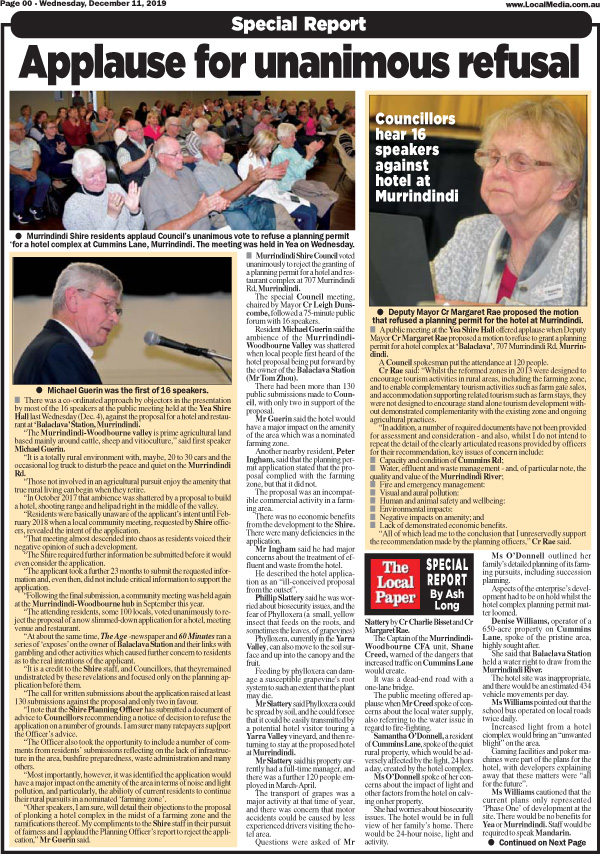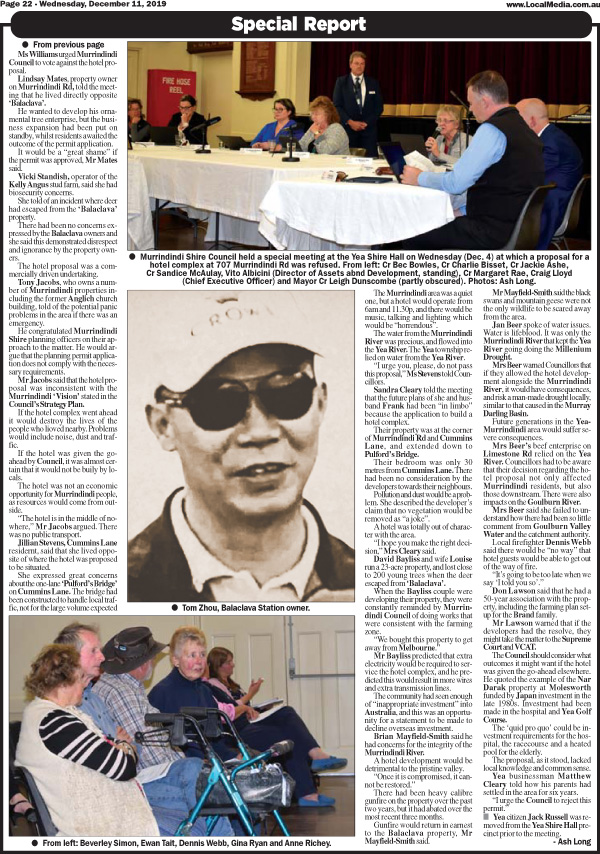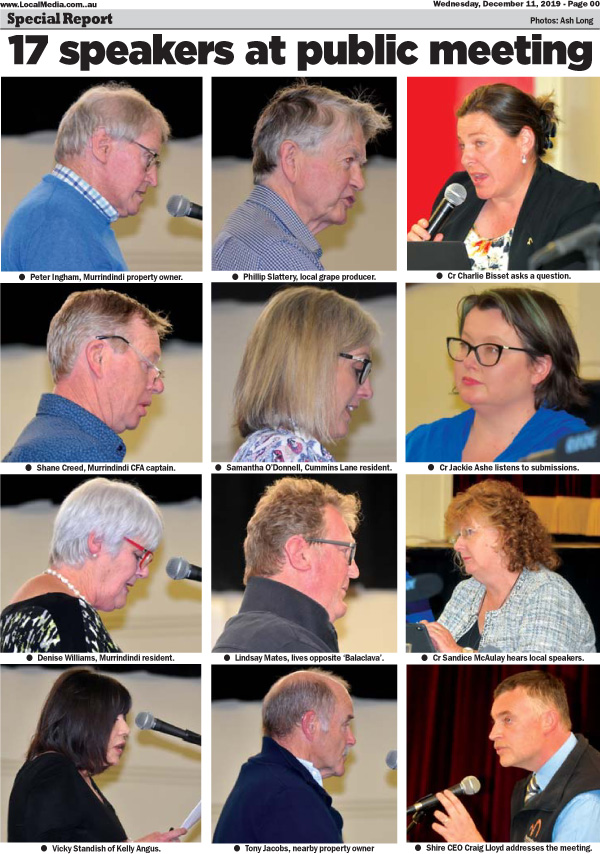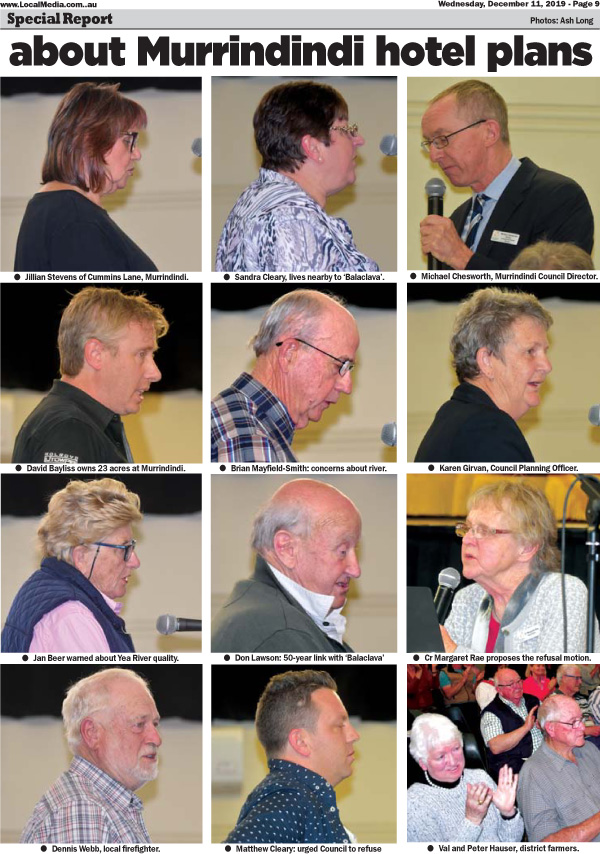
Council rejects M’dindi hotel complex proposal
Thursday, December 5, 2019
Here is a next-morning 2400-word report, with double-page photo spread, after the Murrindindi Council special meeting, refusing the planning permit for a hotel complex at 707 Murrindindi Rd.




Murrindindi Shire Council voted unanimously to reject the granting of a planning permit for a hotel and restaurant complex at 707 Murrindindi Rd, Murrindindi.
The special Council meeting, chaired by Mayor Cr Leigh Dunscombe, followed a 75-minute public forum with 17 speakers.
Resident Michael Guerin said the ambience of the Murrindindi-Woodbourne Valley was shattered when local people first heard of the hotel proposal being put forward by the owner of the Balaclava Station (Mr Tom Zhou).
There had been more than 130 public submissions made to Council, with only two in support of the proposal.
Mr Guerin said the hotel would have a major impact on the amenity of the area which was a nominated farming zone.
Another nearby resident, Peter Ingham, said that the planning permit application stated that the proposal complied with the farming zone, but that it did not.
The proposal was an incompatible commercial activity in a farming area.
There was no economic benefits from the development to the Shire. There were many deficiencies in the application.
Mr Ingham said he had major concerns about the treatment of effluent and waste from the hotel.
He described the hotel application as an “ill-conceived proposal from the outset”.
Phillip Slattery said he was worried about biosecurity issues, and the fear of Phylloxera (a small, yellow insect that feeds on the roots, and sometimes the leaves, of grapevines) Phylloxera, currently in the Yarra Valley, can also move to the soil surface and up into the canopy and the fruit.
Feeding by phylloxera can damage a susceptible grapevine’s root system to such an extent that the plant may die.
Mr Slattery said Phylloxera could be spread by soil, and he could forsee that it could be easily transmitted by a potential hotel visitor touring a Yarra Valley vineyard, and then returning to stay at the proposed hotel at Murrindindi.
Mr Slattery said his property currently had a full-time manager, and there was a further 120 people employed in March-April.
The transport of grapes was a major activity at that time of year, and there was concern that motor accidents could be caused by less experienced drivers visiting the hotel area.
Questions were asked of Mr Slattery by Cr Charlie Bisset and Cr Margaret Rae.
The Captain of the Murrindindi-Woodbourne CFA unit, Shane Creed, warned of the dangers that increased traffic on Cummins Lane would create.
It was a dead-end road with a one-lane bridge.
The public meeting offered applause when Mr Creed spoke of concerns about the local water supply, also referring to the water issue in regard to fire-fighting.
Samantha O’Donnell, a resident of Cummins Lane, spoke of the quiet rural property, which would be adversely affected by the light, 24 hors a day, created by the hotel complex.
Ms O’Donnell spoke of her concerns about the impact of light and other factors from the hotel on calving on her property.
She had worries about biosecurity issues. The hotel would be in full view of her family’s home. There would be 24-hour noise, light and activity.
Ms O’Donnell outlined her family’s detailed planning of its farming pursuits, including succession planning.
Aspects of the enterprise’s development had to be on hold whilst the hotel complex planning permit matter loomed.
Denise Williams, operator of a 650-acre property on Cummins Lane, spoke of the pristine area, highly sought after.
She said that Balaclava Station held a water right to draw from the Murrindindi River.
The hotel site was inappropriate, and there would be an estimated 434 vehicle movements per day.
Ms Williams pointed out that the school bus operated on local roads twice daily.
Increased light from a hotel ciomplex would bring an “unwanted blight” on the area.
Gaming facilities and poker machines were part of the plans for the hotel, with developers explaining away that these matters were “all for the future”.
Ms Williams cautioned that the current plans only represented ‘Phase One’ of development at the site. There would be no benefits for Yea or Murrindindi. Staff would be required to speak Mandarin.
Ms Williams urged Murrindindi Council to vote against the hotel proposal.
Lindsay Mates, property owner on Murrindindi Rd, told the meeting that he lived directly opposite ‘Balaclava’.
He wanted to develop his ornamental tree enterprise, but the business expansion had been put on standby, whilst residents awaited the outcome of the permit application.
It would be a “great shame” if the permit was approved, Mr Mates said.
Vicki Standish, operator of the Kelly Angus stud farm, said she had biosecurity concerns.
She told of an incident where deer had escaped from the ‘Balaclava’ property.
There had been no concerns expressed by the Balaclava owners and she said this demonstrated disrespect and ignorance by the property owners.
The hotel proposal was a commercially driven undertaking.
Tony Jacobs, who owns a number of Murrindindi properties including the former Anglich church building, told of the potential panic problems in the area if there was an emergency.
He congratulated Murrindindi Shire planning officers on their approach to the matter. He would argue that the planning permit application does not comply with the necessary requirements.
Mr Jacobs said that the hotel proposal was inconsistent with the Murrindindi ‘Vision’ stated in the Council’s Strategy Plan.
If the hotel complex went ahead it would destroy the lives of the people who lioved nearby. Problems would include noise, dust and traffic.
If the hotel was given the go-ahead by Council, it was almost certain that it would not be buily by locals.
The hotel was not an economic opportunity for Murrindindi people, as resources would come from outside.
“The hotel is in the middle of nowhere,” Mr Jacobs argued. There was no public transport.
Jillian Stevens, Cummins Lane residernt, said that she lived opposite of where the hotel was proposed to be situated.
She expressed great concerns about the one-lane ‘Pulford’s Bridge’ on Cummins Lane. The bridge had been constructed to handle local traffic, not for the large volume expected The Murrindindi area was a quiet one, but a hotel would operate from 6am and 11.30p, and there would be music, talking and lighting which would be “horrendous”.
The water from the Murrindindi River was precious, and flowed into the Yea River. The Yea township relied on water from the Yea River.
“I urge you, please, do not pass this proposal,” Ms Stevens told Councillors.
Sandra Cleary told the meeting that the future plans of she and husband Frank had been “in limbo” because the application to build a hotel complex.
Their property was at the corner of Murrindindi Rd and Cummins Lane, and extended down to Pulford’s Bridge.
Their bedroom was only 30 metres from Cummins Lane. There had been no consideration by the developers towards their neighbours.
Pollution and dust would be a problem. She described the developer’s claim that no vegetation would be removed as “a joke”.
A hotel was totally out of character with the area.
“I hope you make the right decision,” Mrs Cleary said.
David Bayliss and wife Louise run a 23-acre property, and lost close to 200 young trees when the deer escaped from ‘Balaclava’.
When the Bayliss couple were developing their property, they were constantly reminded by Murrin-dindi Council of doing works that were consistent with the farming zone.
“We bought this property to get away from Melbourne.”
Mr Bayliss predicted that extra electricity would be required to service the hotel complex, and he predicted this would result in more wires and extra transmission lines.
The community had seen enough of “inappropriate investment” into Australia, and this was an opportunity for a statement to be made to decline overseas investment.
Brian Mayfield-Smith said he had concerns for the integrity of the Murrindindi River.
A hotel development would be detrimental to the pristine valley.
“Once it is compromised, it cannot be restored.”
There had been heavy calibre gunfire on the property over the past two years, but it had abated over the most recent three months.
Gunfire would return in earnest to the Balaclava property, Mr Mayfield-Smith said.
Mr Mayfield-Smith said the black swans and mountain geese were not the only wildlife to be scared away from the area.
Jan Beer spoke of water issues. Water is lifeblood. It was only the Murrindindi River that kept the Yea River going doing the Millenium Drought.
Mrs Beer warned Councillors that if they allowed the hotel development alongside the Murrindindi River, it would have consequences, and risk a man-made drought locally, similar to that caused in the Murray Darling Basin.
Future generations in the Yea-Murrindindi area would suffer severe consequences.
Mrs Beer’s beef enterprise on Limestone Rd relied on the Yea River. Councillors had to be aware that their decision regarding the hotel proposal not only affected Murrindindi residents, but also those downstream. There were also impacts on the Goulburn River.
Mrs Beer said she failed to understand how there had been so little comment from Goulburn Valley Water and the catchment authority.
Local firefighter Dennis Webb said there would be “no way” that hotel guests would be able to get out of the way of fire.
“It’s going to be too late when we say ‘I told you so’.”
Don Lawson said that he had a 50-year association with the property, including the farming plan set-up for the Brand family.
Mr Lawson warned that if the developers had the resolve, they might take the matter to the Supreme Court and VCAT.
The Council should consider what outcomes it might want if the hotel was given the go-ahead elsewhere. He quoted the example of the Nar Darak property at Molesworth funded by Japan investment in the late 1980s. Investment had been made in the hospital and Yea Golf Course.
The ‘quid pro quo’ could be investment requirements for the hospital, the racecourse and a heated pool for the elderly.
The proposal, as it stood, lacked local knowledge and common sense.
Yea businessman Matthew Cleary told how his parents had settled in the area for six years.
“I urge the Council to reject this permit.”
• Yea citizen Jack Russell was removed from the Yea Shire Hall precinct prior to the meeting.
- Ash Long
• There was a co-ordinated approach by objectors in the presentation by most of the 17 speakers at the public meeting held at the Yea Shire Hall last Wednesday (Dec. 4), against the proposal for a hotel and restaurant at ‘Balaclava’ Station, Murrindindi.
“The Murrindindi-Woodbourne valley is prime agricultural land based mainly around cattle, sheep and vitioculture,” said first speaker Michael Guerin.
“It is a totally rural environment with, maybe, 20 to 30 cars and the occasional log truck to disturb the peace and quiet on the Murrindindi Rd.
“Those not involved in an agricultural pursuit enjoy the amenity that true rural living can begin when they retire.
“In October 2017 that ambience was shattered by a proposal to build a hotel, shooting range and helipad right in the middle of the valley.
“Residents were basically unaware of the applicant’s intent until February 2018 when a local community meeting, requested by Shire officers, revealed the intent of the application.
“That meeting almost descended into chaos as residents voiced their negative opinion of such a development.
“The Shire required further information be submitted before it would even consider the application.
“The applicant took a further 23 months to submit the requested information and, even then, did not include critical information to support the application.
“Following the final submission, a community meeting was held again at the Murrindindi-Woodbourne hub in September this year.
“The attending residents, some 100 locals, voted unanimously to reject the proposal of a now slimmed-down application for a hotel, meeting venue and restaurant.
“At about the same time, The Age -newspaper and 60 Minutes ran a series of ‘exposes’ on the owner of Balaclava Station and their links with gambling and other activities which caused further concern to residents as to the real intentions of the applicant.
“It is a credit to the Shire staff, and Councillors, that theyremained undistratcted by these revelations and focused only on the planning application before them.
“The call for written submissions about the application raised at least 130 submissions against the proposal and only two in favour.
“I note that the Shire Planning Officer has submitted a document of advice to Councillors recommending a notice of decision to refuse the application on a number of grounds. I am surer many ratepayers sup[port the Officer’s advice.
“The Officer also took the opportunity to include a number of comments from residents’ submissions reflecting on the lack of infrastructure in the area, bushfire preparedness, waste administration and many others.
“Most importantly, however, it was identified the application would have a major impact on the amenity of the area in terms of noise and light pollution, and particularly, the abilioty of current residents to continue their rural pursuits in a nominated ‘farming zone’.
“Other speakers, I am sure, will detail their objections to the proposal of plonking a hotel complex in the midst of a farming zone and the ramifications thereof. My compliments to the Shire staff in their pursuit of fairness and I applaud the Planning Officer’s report to reject the application,” Mr Guerin said.
• A public meeting at the Yea Shire Hall offered applause when Deputy Mayor Cr Margaret Rae proposed a motion to refuse to grant a planning permit for a hotel complex at ‘Balaclava’, 707 Murrindindi Rd, Murrin-dindi.
A Council spokesman put the attendance at 120 people.
Cr Rae said: “Whilst the reformed zones in 2013 were designed to encourage tourism activities in rural areas, including the farming zone, and to enable complementary tourism activities such as farm gate sales, and accommodation supporting related tourism such as farm stays, they were not designed to encourage stand alone tourism development without demonstrated complementarity with the existing zone and ongoing agricultural practices.
“In addition, a number of required documents have not been provided for assessment and consideration – and also, whilst I do not intend to repeat the detail of the clearly articulated reasons provided by officers for their recommendation, key issues of concern include:
• Capacity and condition of Cummins Rd;
• Water, effluent and waste management – and, of particular note, the quality and value of the Murrindindi River;
• Fire and emergency management:
• Visual and aural pollution:
• Human and animal safety and wellbeing:
• Environmental impacts:
• Negative impacts on amenity; and
• Lack of demonstrated economic benefits.
“All of which lead me to the conclusion that I unreservedly support the recommendation made by the planning officers,” Cr Rae said.

